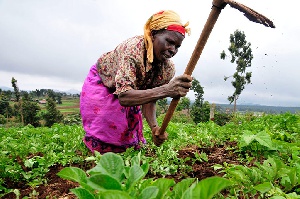The United State government is to invest US$38miilion loan facility to support private sectors into seed production to boost agriculture for smallholder farmers in the three northern regions of Ghana.
The initiative under the United States International Agency Development (USAID) - Feed the Future (FTF) programme will enable beneficiaries to access the funds to produce quality seeds for farmers to ensure high yields in their productions.
It would also help farmers to harvest more products to meet the demands of consumers as well as to generate revenue to enhance their livelihoods.
This was revealed at the launch of the 6th edition of the annual Northern Ghana Pre-season Planning and Networking Forum in Tamale in the Northern Region.
The Annual Northern Ghana Pre-season and Networking forum is an initiative of the USAID’s Feed the Future (FTF) programme led by the Agricultural Technology Transfer project (ATT) to ensure the provision of modern technological equipment and ways of farming to boost agribusiness in the country.
The launch brought together farmers, seed producers, commodity buyers, processors, input dealers, financial institutions, among others to interact, network and establish market linkages in the agricultural sector for the 2016 planting and harvesting season.
This year’s conference was under the theme: "Improving Agricultural Productivity in Northern Ghana; Role of Quality Seeds” and is expected to host over 850 stakeholders in the maize, rice and soybean value in the northern regions.
Speaking at the launch, the Northern Regional Director of Agriculture, Mr. William Boakye Akyeampong, commended the organisations for their initiative, saying acquisition of quality seed is a problem in the country.
He advised farmers to take advantage of the forum to adapt to new technology that would build up their activities to earn a living.
The Chief of Party for the Feed the Future Agriculture Policy Support project, Dr. Walter Nunez Rodriguez, noted that farmers encounter post harvest losses due to the kind of seeds introduced to them as well as financial status.
According to him, the seed sector can only be addressed through a licensing agreement mechanism, which protects the breeder and the private sector in the seed production.
The importance of seed to any crop based production system cannot be overemphasized. Improving the quality of seed of any preferred variety is the basis for agricultural productivity improvement.
He stated that about 80 percent smallholder farmers in the country mainly get their seeds from the informal channels which include farmers own saved seeds, seed exchanges among farmers and purchases from the local grain dealers adding that only two parallel seed systems exist in the country that is the formal system established by the state.
He noted that the challenges in the seed sector can be addressed if government implements licensing agreement among stakeholders in the seed sector.
Lack of enforcement of the laws to ensure right seeds are sold to the farmers hamper their activities and therefore are called for conscious efforts by government and its development partners to strengthen the formal seed sector to protect local farmers.
Click to view details



Business News of Wednesday, 27 April 2016
Source: B&FT
US supports agric sector with US$38 million
Entertainment
















